Miscellaneous Travel Unusual Experiences
The Hidden Messages of Passport Stamps

A few years ago in West Africa, I had to travel overland between Benin and Nigeria twice. This border crossing is known as one of the most corrupt in the world, and it certainly met my expectations for entrepreneurial activity among the numerous officials.
From the moment I entered the Nigerian side, I encountered at least ten requests for bribes. The first one was pretty straightforward—a soldier took my passport, put it behind his back, and asked, “What do you have for me today?”
I thought that was pretty considerate. No need to waste time with formalities or explain the technical details of why you need to pay up.
I told him I had a visa that I had already paid more than $100 for. Because the visa was so expensive, I said, regretfully I had no more money to pay at the border.
He let me go, and I had similar encounters with the next five or six guys. (I’m not exaggerating.) In each encounter I managed to get away without paying anything, which I considered to be a great success. They were clearly trying to intimidate visitors, reasoning that many of them will pay at least something to get through unobstructed.
That experience caused me to think more about passport stamps and visas. I’ve come up with a theory that you can learn a lot about a country by observing what they put in your passport.
Here are 13 examples from my own travels (click to enlarge any image):

Belgium, Denmark, Holland, etc. – All very easy. They don’t take up much space, and most European Union immigration guys will happily stamp wherever you tell them to. Even better, for U.S. passports they often won’t stamp at all, saving up needed space for later. Sometimes I’ve even been waved through as soon as they see the passport, which I’m not sure is the best security, but I shouldn’t complain about quick immigration.
***
 China vs. Taiwan – Military efficiency for the country that attracts more visitors than anywhere else in Asia. It’s now possible to get a visa on arrival in China, but most people do it in advance through the embassy. In Taiwan, on the other hand, they fall over themselves to attract visitors to the small island. There is no visa requirement for most Western countries, no questions at immigration, and no fees whatsoever. In other words, they’re desperate.
China vs. Taiwan – Military efficiency for the country that attracts more visitors than anywhere else in Asia. It’s now possible to get a visa on arrival in China, but most people do it in advance through the embassy. In Taiwan, on the other hand, they fall over themselves to attract visitors to the small island. There is no visa requirement for most Western countries, no questions at immigration, and no fees whatsoever. In other words, they’re desperate.
***
 New Zealand—It’s in the upper left corner, surrounded by more Brussels stamps. Kiwi immigration is efficient but strict. It’s one of the few Western countrieswhere I’ve had to explain in detail what I’m doing in the country, where I’m staying, and so on. They even asked to see my credit cards and return plane ticket. To make up for all the intrusion, once you are finally released from immigration they offer a free cup of coffee to all new arrivals.
New Zealand—It’s in the upper left corner, surrounded by more Brussels stamps. Kiwi immigration is efficient but strict. It’s one of the few Western countrieswhere I’ve had to explain in detail what I’m doing in the country, where I’m staying, and so on. They even asked to see my credit cards and return plane ticket. To make up for all the intrusion, once you are finally released from immigration they offer a free cup of coffee to all new arrivals.
***
 Vietnam – I had to send off my passport to Washington, D.C. for this one, which I never like doing, but it worked out okay. $60 and a week later, I had an invitation to visit The Socialist Republic of Vietnam. Arrival and departure was easy, and no questions were asked. I think Vietnam is on the up, and I won’t be surprised if they make the visa process even easier in the future.
Vietnam – I had to send off my passport to Washington, D.C. for this one, which I never like doing, but it worked out okay. $60 and a week later, I had an invitation to visit The Socialist Republic of Vietnam. Arrival and departure was easy, and no questions were asked. I think Vietnam is on the up, and I won’t be surprised if they make the visa process even easier in the future.
***
 Burma (Union of Myanmar) – This one looks a bit like the Liberia one (see below), although not quite as bad. I had heard some bad stories about traveling through the capital of Rangon, but when I went there in 2006, everyone in the airport was on the verge of falling asleep, even though it was the early evening. Of course, life is not as good for most of the Burmese people, with the ruling junta preserving their power by domination over the population.
Burma (Union of Myanmar) – This one looks a bit like the Liberia one (see below), although not quite as bad. I had heard some bad stories about traveling through the capital of Rangon, but when I went there in 2006, everyone in the airport was on the verge of falling asleep, even though it was the early evening. Of course, life is not as good for most of the Burmese people, with the ruling junta preserving their power by domination over the population.
***
 South Africa – It’s kind of like the United States – I love the country, but don’t enjoy the immigration experience. I went in and out several times one summer, and each time I waited an hour before they used up at a full page in the passport. I tried to get them to use the same page once, but my request was unheeded. Perhaps next time.
South Africa – It’s kind of like the United States – I love the country, but don’t enjoy the immigration experience. I went in and out several times one summer, and each time I waited an hour before they used up at a full page in the passport. I tried to get them to use the same page once, but my request was unheeded. Perhaps next time.
***
 Pakistan – I arrived in Pakistan without a visa, and the immigration officials were shocked. “How did you get on the plane?” they asked. (Airlines are not supposed to let anyone board without proper documentation for the destination.) It was a long story, and it took a long time to explain it. In the end, I received the first business visa to be given to an independent traveler in 28 years — or so they told me. I was grateful.
Pakistan – I arrived in Pakistan without a visa, and the immigration officials were shocked. “How did you get on the plane?” they asked. (Airlines are not supposed to let anyone board without proper documentation for the destination.) It was a long story, and it took a long time to explain it. In the end, I received the first business visa to be given to an independent traveler in 28 years — or so they told me. I was grateful.
***
 Guinea – Here we start to run into problems. Check out this well-stamped visa from La Republique de Guinee. It’s a stamp-happy country. Countries like this are inefficient at best and terribly corrupt at worst. Contrast this approach with Benin, which clearly presents itself as a more organized country just by the visa.
Guinea – Here we start to run into problems. Check out this well-stamped visa from La Republique de Guinee. It’s a stamp-happy country. Countries like this are inefficient at best and terribly corrupt at worst. Contrast this approach with Benin, which clearly presents itself as a more organized country just by the visa.
***
 Zimbabwe – I received this one at the Zambia border crossing. (By the way, Zambia was quite organized.) There was much confusion at the immigration office, with my driver first telling me that he could get the visa himself so I wouldn’t have to get out of the car. Great, I said. But then he came back out a few minutes later looking defeated. I went in, paid $10, and eventually got this nice piece of paper in my passport. Before I left a few days later, I paid one million dollars for a Diet Coke at the Victoria Falls Hotel.
Zimbabwe – I received this one at the Zambia border crossing. (By the way, Zambia was quite organized.) There was much confusion at the immigration office, with my driver first telling me that he could get the visa himself so I wouldn’t have to get out of the car. Great, I said. But then he came back out a few minutes later looking defeated. I went in, paid $10, and eventually got this nice piece of paper in my passport. Before I left a few days later, I paid one million dollars for a Diet Coke at the Victoria Falls Hotel.
***
 Syria – The Syrian consulate in California gave me the hardest time about my visa. At first I was turned down without explanation, and when I called to scope it out, the guy informed me that I had made seven errors on my application. Seven errors? Yes, he said. For example, I wrote “0” under “Number of Dependents Accompanying Me,” and I needed to write “NONE.” I realized where this was going.
Syria – The Syrian consulate in California gave me the hardest time about my visa. At first I was turned down without explanation, and when I called to scope it out, the guy informed me that I had made seven errors on my application. Seven errors? Yes, he said. For example, I wrote “0” under “Number of Dependents Accompanying Me,” and I needed to write “NONE.” I realized where this was going.
By the way, he told me in passing, the cost has gone up $40 in the past week since I had applied. What the hell? Anyway, I had no choice. I sent him $40 and miraculously, all seven errors were cleared up. I got the visa and went to Syria.
***
 Egypt – Not sure what’s going on with all the stamps and Arabic text, but this should have been my first clue that Egypt is not only a land of ancient mysteries. I received this one on arrival, in payment for $10 (not $15) at the counter. I guess I should be thankful for the $5 discount, but at the time, I was mostly confused.
Egypt – Not sure what’s going on with all the stamps and Arabic text, but this should have been my first clue that Egypt is not only a land of ancient mysteries. I received this one on arrival, in payment for $10 (not $15) at the counter. I guess I should be thankful for the $5 discount, but at the time, I was mostly confused.
***
 Kosovo – This one is very interesting. Depending on who you ask, Kosovo either is or isn’t a sovereign country yet. If you ask the U.N., the answer is yes — sort of. At least, the United Nations Mission in Kosovo (UNMIK) offers their own immigration service.
Kosovo – This one is very interesting. Depending on who you ask, Kosovo either is or isn’t a sovereign country yet. If you ask the U.N., the answer is yes — sort of. At least, the United Nations Mission in Kosovo (UNMIK) offers their own immigration service.
BUT, be careful — the Serbs do not recognize Kosovo’s independence, or UNMIK’s presence for that matter. To go from Kosovo to Belgrade, you have to go back out the way you came and take a different bus. Otherwise, you’ll be thrown out of the country — and which country you’re being thrown out of depends on where you interpret yourself as being. Not for beginners!
***
 Liberia – I think they’ve gotten better since then, but this one is absolutely hilarious. This is the first visa I received to visit the republic of Liberia, way back in 2004 and only shortly after a series of long civil wars had ended. The cost for this homemade sticker? $75 U.S., payable in cash only. The best part was when my friend took our passports to the embassy in Freetown, Sierra Leone to get the visas. Upon handing over the cash ($75 x 4, or $300) the man simply put it directly into his pocket with a smile.
Liberia – I think they’ve gotten better since then, but this one is absolutely hilarious. This is the first visa I received to visit the republic of Liberia, way back in 2004 and only shortly after a series of long civil wars had ended. The cost for this homemade sticker? $75 U.S., payable in cash only. The best part was when my friend took our passports to the embassy in Freetown, Sierra Leone to get the visas. Upon handing over the cash ($75 x 4, or $300) the man simply put it directly into his pocket with a smile.
We said later that if we had known the money wasn’t really going to the state, we would have tried bargaining for our visas. “How’s $40? Would $40 work for you?”
Our second idea was to start up our own operation printing Liberian visas, and charging a discount on the $75 official rate. We could then give the profits to a number of Liberian refugees we knew. As much fun as this would have been, it’s probably good that we didn’t go much further with that particular microenterprise project.
***
From Albania to Zimbabwe, I’ve been a lot of places so far. But from Andorra to Yemen, there are still a lot that remain. As I continue my journeys throughout the next four years, I’ll pay close attention to the stamps and visas that I accumulate in my thick passport.
###
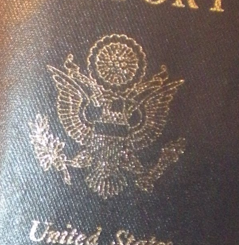

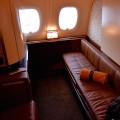
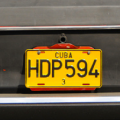
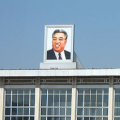
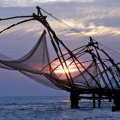
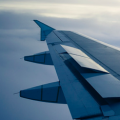
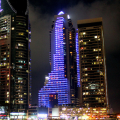
14 Comments
Hi Chris,
This is a great post — really interesting and well documented. I forget how I happened upon you but, as a consummate non-conformist (via nature and nurture rather than conscious design) I’ve been lurking for a little while. Glad to raise my hand for a compliment. Looking forward to continuing to follow….
Cheers,
Suzanne
So true! Visas, stamps and immigration processes can tell you so much about a country – where it’s at in terms of openness, efficiency, bribery, etc.
I almost feared going to the Turkmen and Uzbek Embassies to get our visas, but the consuls were almost giddy to have something to do (not many people are applying for visas in Armenia and Azerbaijan I guess) and we got our visas almost immediately. The headache came before the Embassy visits – getting the right paperwork together to apply for the visa (Letter of Invitation – LOI). This experience was a taste of what to come in those countries – the government’s requirements and bureaucracy are almost strangling, but the people themselves are friendly and open.
The visa process with Kazakhstan was also really telling. At that time (July 2007), Kazakhstan was promoting itself as a modern place to visit and do business on CNN (partly in reaction to Borat). The Kazakh gov’t had taken away the requirement of LOIs and other nasty paperwork for US and EU citizens about six months prior. However, no one at the Embassy in Uzbekistan seemed to have been informed about this. They hassled us for LOIs (but even the local travel agents couldn’t provide them since it wasn’t a requirement), so we printed out the Kazakh visa law in English with the appropriate sections circled and handed it in with our visa applications. When I went to pick up the visa three days later, I was interrogated for thirty-minutes by the Consul on why I wanted to visit Kazakhstan and who was sponsoring me. He eventually got tired of my responses in simple Russian – we are tourists, we want to see your country, no one is sponsoring us, etc. – and let me go with the visas. If my husband had been with me, I’m not so sure whether we would have had the same positive outcome – they might have hassled him more. Being a woman can be advantageous sometimes. Our border crossing into Kazakhstan almost killed us and then we had to register ourselves within three days at the foreigner’s police in another mob of people.
If you are a western business traveler applying for your Kazakh visa in a western country and flying into an airport, you avoid almost all of this. Kazakhstan puts on a good face for business and organized tours, but if you want to understand the place, go in as an independent tourist.
@Suzanne,
So nice to meet you! I like your artwork.
@Audrey,
Thanks so much to adding to the post with your fun stories of independent adventures in Central Asia. You guys are quite the travelers.
Love the commentary and the pics! I’m jealous that you got to keep the Vietnam visa. I went in Nov 2007 and the visa was a loose piece of paper that they took upon departure.
My girlfriend is heading to Cambodia in January for two months to do some non-profit work, and they don’t offer multi-entry visas, so she’s thrilled at the chance to pay for multiple visas to cover her intra-region travels!
Thanks for the post!
I too love South Africa. I visited SA, Lesotho, Botswana, and Zambia in one wonderful month long trip. I only had problems with long lines and inefficiency when crossing between SA and Lesotho. The Botswana crossing was a breeze.
We had big problems trying to get into Zambia from Botswana. We had paid for our visas already, but they wanted $167 US only, because the US supposedly upped their visa price for Zambis to that amount… so Zambian customs said. It was near the end of our trip, so very few of us had that much left. Fortunately, we were able to negotiate them down to $20 per person. They took our passports and the money, then demanded another $10. It was a little frightening having the agent hold on to our passports while a stoic and peeved looking soldier stood nearby. We paid the $10, but got stopped frequently on the road by fake police/military personnel who demanded money to continue driving.
It was all worth it to see and experience Victoria Falls. Being on the Zambia side, I got to walk through the gorge opposite the waterfall. The tremendous water force kicks mist into the air, so it is constantly raining. Now I know why the locals call it “the smoke that thunders.” I couldn’t even see, there was so much water everywhere, loud, almost deafening… amazing experience.
I am glad that I was traveling with a good negotiator, otherwise, I may not have been able to enter Zambia and see the falls or bring donations to the school in Livingstone.
Nice post Chris. One thing you haven’t touched on much is that some countries reject entry if you have evidence of having visited certain other countries. There is a lot of mystery and myths on this one.
In practice it seems to be less of a problem than some references on the internet make out. However, it does still matter with some countries. The countries that are persona non gratis with certain other countries (eg Israel) are well aware of the issue and general help out by stamping a loose piece of paper if asked instead of your passport. Nonetheless in some cases the only options are to have a second passport if your own country allows it (some do and some don’t), or try to time your visits so that they are on different passports (eg one before a passport fills up/expires and the other after).
Personally, I wish more countries could be like Switzerland and not be stamp happy. My current passport is just over a year old and already I’m running out of blank pages for visas.
Wow, unfortunately being in the miliary I don’t get to collect too many stamps, but I think I have one for Germany and Turkey at the moment. What a great way to sum up the experience.
Hey guys. Good points from everyone – thank you. I am away this week, so I don’t have much time to respond here, but I will read all the comments as soon as I can.
@Global,
Yes, you are correct that there are some places you need to be careful about the stamps (Israel for everyone, Cuba for U.S. citizens, etc.) and also correct that this is not as big a deal as many people think it is.
One good thing about U.S. passports is that they allow for unlimited (and free) passport page additions. I have had three sets done so far, and everywhere I go someone comments on how thick my passport is. I am going to miss that in a couple of years when it expires completely.
Loved this post and all the follow-on comments/stories! Something I learned during a scary border crossing between Honduras and El Salvador was to always pay attention to which page they stamp your passport when you enter the country. Otherwise they might not let you leave!
I’m actually a little disappointed when a place doesn’t bother to stamp passports. I’d also like to see a bit more creativity in the designs of the stamps (Europe gets low marks in this category). So far, my favorite is Montserrat, with a big unexpected green shamrock.
i am trying to figure out of passport stamps indicate how much time u can stay in the country’
is this true?
if so, where is this number? and why dont they say how much time u have?
one example is my passport to enter madrid says
22.07.08 21
what does the 21 mean?
and then the exiit says
28.07.08 23
what does the 23 mean?
thanks
Hi,
your experience is surely an incite to all travelers and they can surely pick a clue to get prepare themselves when they travel to these destinations.
Its surely a nice, interesting and useful post.
I like to add here that no immigration Officer is trained to be irrational, rude, corrupt and indecent. They are told that they are key to the country, any foreigner who is coming an going immigration is the last an first official with whom he interacts. So the theory of ” First Impression is the last impression”.
But there are so many factors that an Immigration official ha to deal in his day to day working and lastly its the individual how he does his job.
Just be grateful you’re travelling on a US passport. Just think of what some of us have to go through to get into the US or other countries that you don’t need a visa for.
The good news is that you can now apply for your Vietnam visa online – $20 processing fee (and $25 fee for the visa) and its waiting for you at the airport when you arrive!
My favourite “entry” is going into Namibia from South Africa. There were 20 of us on a tour and the officials (with very little else to do) had been perfecting their autographs until they were works of art. Each signature on the entry stamp took around a minute to complete!
There are some visa’s that I would rather not have as they waste space, but was recently very disappointed that the DPRK wouldn’t stamp my passport (and they took the visas too) so all I have is a cryptic exit stamp from DangDong in China!
I just happened across this post through the link in today’s – I really love your interpretation of the stamps and little bits of experience with different peoples. Humans are fascinating creatures. I would say I envy your experience with them, but rather, the bits of experience you share make me anticipate more eagerly the adventures I have planned for my future. I love that you pay attention to these bits of the adventure that others might just call tedious neccessary bits. Some people travel and only talk about food and scenery. One rarely hears about the tiny human interactions that are just as exotic and fascinating.
On an aside, I am so glad I encountered your blog/newsletter. At least once or twice a week, you write something that is very helpful and thought provoking. I’m still pondering the “interview yourself” idea and asking myself questions. It’s proven to be a useful tool as I wrap up some loose ends in my life and plan my next chapter.
Thanks for everything you do!
Your comments are welcome! Please be nice and use your real name.
If you have a website, include it in the website field (not in the text of the comment).
Want to see your photo in the comments? Visit Gravatar.com to get one.